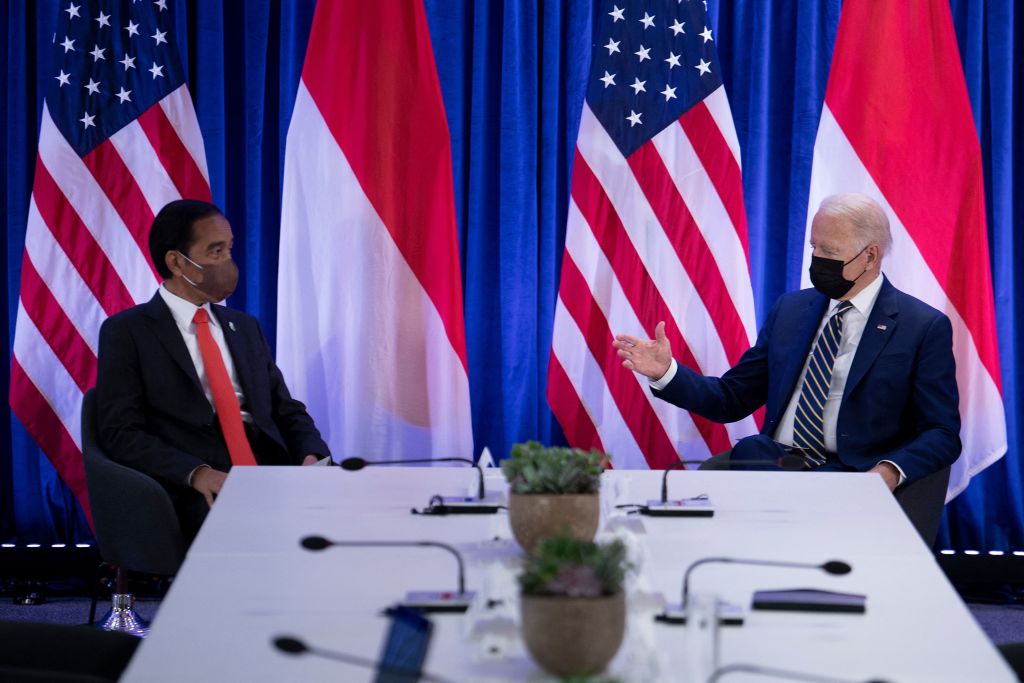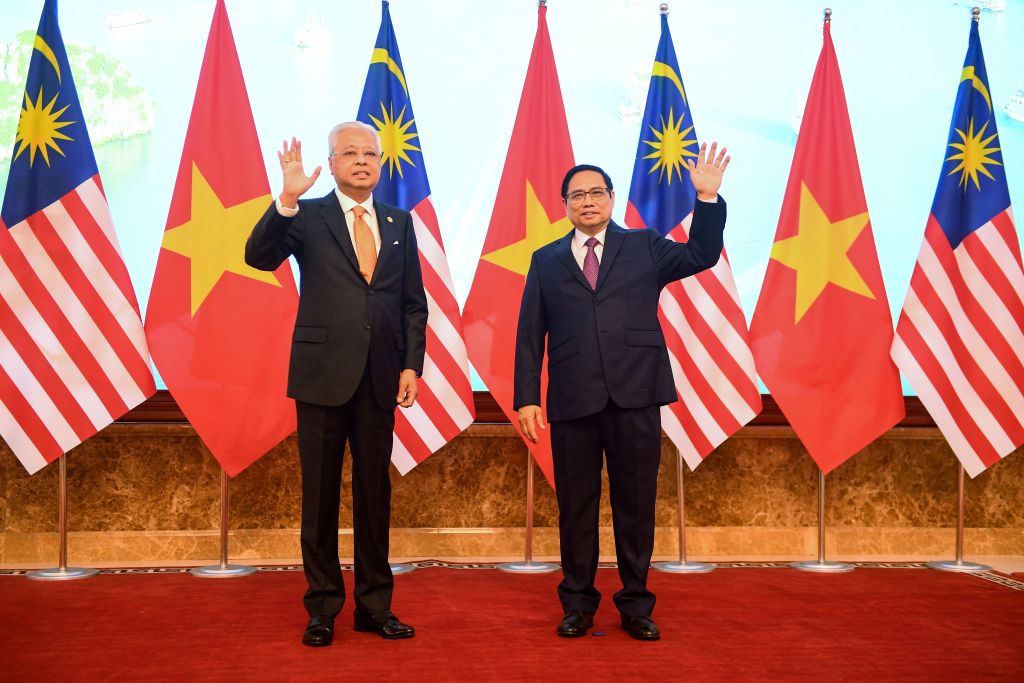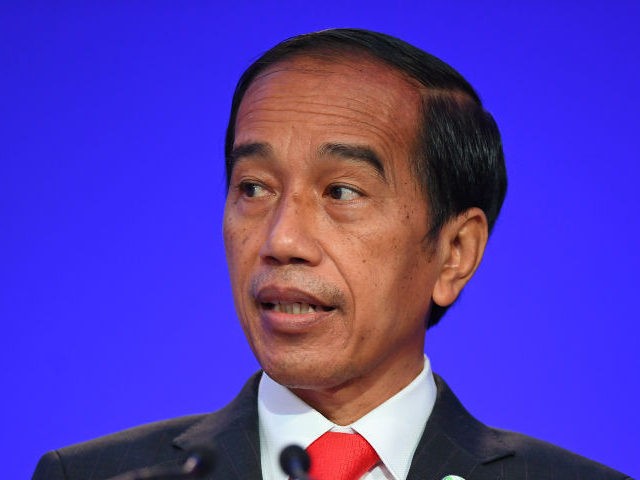The Foreign Ministry of Indonesia issued remarks on Thursday insisting it was not offended that no American government officials greeted President Joko Widodo upon his arrival in Washington, DC, on Tuesday.
The Foreign Ministry cited as proof that President Joe Biden did not mean any offense by not sending representatives of his administration to meet the top government official of Indonesia by noting the fact that the Biden administration similarly snubbed the heads of the governments of Malaysia, Vietnam, and Cambodia.
The leaders are in Washington for a high-level summit hosted by Biden and Vice President Kamala Harris of members of the Association of Southeast Asian Nations (ASEAN).
“The Special Summit will demonstrate the United States’ enduring commitment to ASEAN, recognize its central role in delivering sustainable solutions to the region’s most pressing challenges, and commemorate 45 years of U.S.-ASEAN relations,” according to the State Department.
President Joko Widodo, known in his country as “Jokowi,” traveled 24 hours to attend the summit in person. Secretary of State Antony Blinken attended the first session on Thursday virtually. Blinken had retreated from the public eye due to a Chinese coronavirus infection but ended his quarantine on Thursday.
The south Asian outlet Coconuts observed on Wednesday that Indonesians had begun to express dismay in the past day after video began circulating of Jokowi’s arrival to the United States. Jokowi appears to be greeted by a small group of Indonesian officials and no American politicians. He arrived at 9:40 p.m. – not an outrageous hour for an official to make time to meet him.
“The talking point back home was what seemed a peculiar scene (shown in the YouTube video below) of Jokowi, along with First Lady Iriana, stepping off the plane and not being greeted by any high-ranking US official. In fact, the footage shows that Jokowi was greeted by Indonesia’s Ambassador to the US, Rosan Roeslani,” Coconuts explained. “Many in Indonesia perceived that the lack of a grand welcome was a slight against Jokowi. Critics of the president particularly had a field day, claiming that this proved their belief of Jokowi’s insignificance in world politics.”
The Indonesia Foreign Affairs Ministry addressed the concerns by calling criticism of the situation “regrettable” and noting that the other South Asian leaders traveling to Washington for the conference similarly failed to receive greetings from Biden officials upon landing.

President of Indonesia, Joko Widodo, and U.S. President Joe Biden at the COP26 UN Climate Change Conference in Glasgow, Scotland, on November 1, 2021. (BRENDAN SMIALOWSKI/AFP via Getty Images)
“The Indonesian president’s visit to Washington D.C. is not a bilateral visit. He’s there to attend the ASEAN-US Special Summit,” a Foreign Affairs Ministry spokesman insisted, according to Coconuts.
“We saw that all [ASEAN countries] arriving [in the US] received the same treatment,” he insisted.
Coconuts observed that the other heads of government the Indonesian government used as examples – Cambodian Prime Minister Hun Sen, Malaysian Prime Minister Ismail Sabri, and Vietnamese Prime Minister Phạm Minh Chính – also appeared in similar videos greeted only by citizens and officials of their respective countries.
Cambodian news outlets noted that Hun Sen “was warmly welcomed upon his arrival at Willard Intercontinental hotel by many Cambodian Americans and Cambodian Canadians,” but did not report any American officials greeting him upon landing.
Malaysian Prime Minister Ismail Sabri “was greeted on arrival by Foreign Minister Datuk Seri Saifuddin Abdullah,” but similarly not by Biden officials, according to that country’s New Straits Times.
Vietnamese Prime Minister Pham Minh Chinh did reportedly shake hands with one American official upon landing: American Ambassador to Vietnam Marc Knapper.

Malaysia’s Prime Minister Ismail Sabri Yaakob (L) poses for photos with Vietnam’s Prime Minister Pham Minh Chinh (R) in Hanoi, Vietnam, on March 21, 2022. Sabri was not greeted by any U.S. officials upon arriving for the ASEAN summit, while the only U.S. official to greet Chinh upon arrival was the U.S. Ambassador to Vietnam. (NHAC NGUYEN/AFP via Getty Images)
Biden boldly declared, “democracy is back!” during his first foreign policy address after taking office in February 2021, condemning predecessor Donald Trump’s alleged lack of attention to friendly nations.
“Though many of these values have come under intense pressure in recent years, even pushed to the brink in the last few weeks, the American people are going to merge from this stronger, more determined and better equipped to unite the world in fighting to defend democracy – because we have fought for it ourselves,” Biden claimed.
The ASEAN controversy follows similar incidents, however, that have tarnished planned meetings at the highest levels with some of America’s closest allies, neighbors, and countries with whom Washington had no previous significant animosity. In December, for example, the president of South Africa, Cyril Ramaphosa, refused to attend a State Department “democracy summit” in protest of Biden imposing a travel ban on his country. Biden banned South Africans from entering America in response to the discovery of the omicron variant of Chinese coronavirus. While South African scientists were the first to identify the variant and alert global health authorities, evidence later revealed that the variant most likely originated in Europe. Biden did not impose a similar travel ban on the European countries implicated, such as the Netherlands and Belgium.
Los Angeles is set to host next month’s Summit of the Americas, bringing together member nations of the Organization of American States (OAS). Multiple presidents – including those of the two largest economies in Latin America, Mexico and Brazil, and Argentina and Bolivia – have already signaled that they either have no interest in attending or will not do so, in the case of the leftist regimes, out of concern that communist dictators from Cuba, Nicaragua, and Venezuela may not be invited.
The Biden administration has not officially barred the dictatorships from attending at press time.

COMMENTS
Please let us know if you're having issues with commenting.